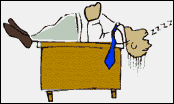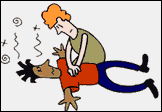Narcolepsy, Cataplexy and Sleep Paralysis
Overview of Narcolepsy
 Narcolepsy is a neurological sleep disorder that causes the patient to feel constantly tired and sleepy. Sufferers can fall asleep at anytime, anywhere, and no matter what they are doing.
Narcolepsy is a neurological sleep disorder that causes the patient to feel constantly tired and sleepy. Sufferers can fall asleep at anytime, anywhere, and no matter what they are doing.Narcoleptics nearly always suffer from Cataplexy. This is where a patient can collapse in a heap, seemingly for no reason, and usually at the most inappropriate time. During these uncontrollable attacks, the patient remains fully alert, but can't move or do anything. Narcoleptics may also suffer from Sleep Paralysis, where on falling asleep or on wakening, the patient is unable to speak or move for a short while.
It affects about one in 2000 people, meaning that as many as three million people could be experiencing the problem in the UK. The condition usually becomes noticeable in the teenage years, but can develop in later life. It is thought to be hereditary, and can affect any person at any age. It is normally a life-long condition, though a person with Narcolepsy can expect to have a normal life span.
Symptoms of Narcolepsy
- Excessive daytime tiredness
- Continual lack of energy and persistent drowsiness
- Daytime sleep attacks, which can occur without warning
- Cataplexy (the loss of voluntary muscle control)
- Sleep Paralysis, just before or after sleep
- Hallucinations and frighteningly realistic dreams
- Disturbed nightly rest, frequent awakenings, nightmares etc
If you have some or all of the above symptoms, it would be advisable to see your doctor.
Cataplexy
 Cataleptic attacks are a sudden loss of muscle control. This may be just a slight feeling of weakness, such as sagging facial muscles. The head might drop forward or worse, buckling of the knees resulting in total collapse of the person.
Cataleptic attacks are a sudden loss of muscle control. This may be just a slight feeling of weakness, such as sagging facial muscles. The head might drop forward or worse, buckling of the knees resulting in total collapse of the person.In severe cases, the patient can become completed paralysed, lasting for a few seconds to several minutes. During this time, the patient may seem to be unconscious, but can be fully awake and temporarily unable to move. A very frightening situation to be in. These attacks can be brought on by emotions: anger, surprise, fear or even laughter.
Sleep Paralysis
It is thought to be linked it with REM (rapid eye movement) which is a sign of dreaming. When this happens, the muscles relax and the brain blocks signals that would normally allow the limbs to move, so preventing the body from acting out your dreams. One suggestion for the cause is that the sleeper's connection with the dream world switches off and they suddenly become self aware. They want to move but can't because the brain hasn't caught up with the new development and still believes it has to keep the body immobile. With the inability to move, fear can set in, which may cause hallucinations. There also appears to be a connection between sleep deprivation and sleep paralysis, as this is confirmed by the number of people who work nights and get it.
Though alarming to the patient, sleep paralysis is said to be harmless, but chronic insomnia can develop in sufferers who are afraid of a repeat episode. That fear, coupled with a lack of sleep, probably makes a recurrence more likely. Knowing that this condition is common and not an indication of something more sinister, reassurance from your doctor may be all that is needed to stop future occurrences.
How dangerous is Narcolepsy?
 Narcolepsy is not dangerous in itself, but it is usually accompanied by Cataplexy. A cataleptic attack could happen at anytime in the home, at work or in leisure time or sport.
Narcolepsy is not dangerous in itself, but it is usually accompanied by Cataplexy. A cataleptic attack could happen at anytime in the home, at work or in leisure time or sport.A sudden total collapse could be potentially life threatening, if operating or close to running machinery. Friends and work colleagues should be told exactly what to do if an attack does happen.
- Check the person is in safe position to recover away from other dangers, electrical appliances
- Make sure the person is as comfort as possible, checking there is no unnatural limb or body positions
- Allow the person to recover in their own time
Uncontrollable "Sleep Attacks" can also develop into dangerous situations e.g. operating machinery, driving a car or even cooking.
How is Narcolepsy treated?
 There is no known cure yet, and the exact cause is still not known. It is thought to be an abnormality of the brain chemistry, and research is still being done.
There is no known cure yet, and the exact cause is still not known. It is thought to be an abnormality of the brain chemistry, and research is still being done.The symptoms can be helped with drugs. Daytime sleepiness can be treated with stimulants, while the Cataplexy can be treated with anti-depressants. Narcolepsy has been found to be hereditary, but although it is a life-long condition, most patients will have a normal healthy life span.
The problems created by this disorder can be social and financial. Some people may find a collapsed person disturbing and panic. Getting suitable employment after being diagnosed with this condition would probably be hard to do, as you should always inform an employer for insurance purposes.Note: This information is not medical advice. Always see your doctor if you have a health problem.